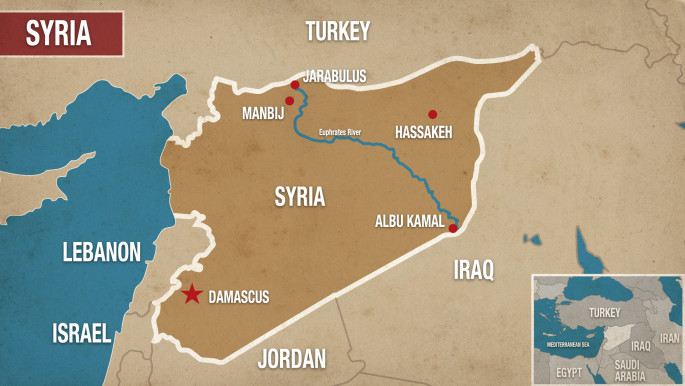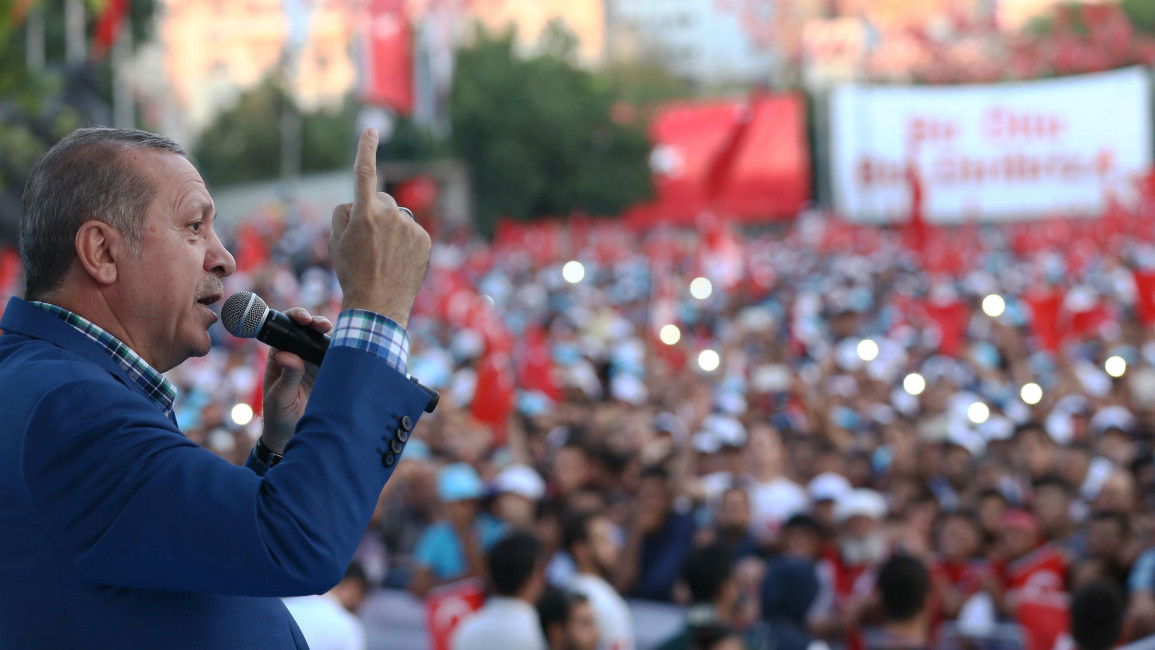Turkey will bring back death penalty vows Erdogan
Turkey will bring back death penalty vows Erdogan
Turkish President Recep Tayyip Erdogan has called for a return of the death penalty, while also vowing to fight Kurdish and Islamic State group militants with the 'same determination'.
4 min read
President Erdogan has waged war on Gulenists, jihadis and Kurdish militias [Anadolu]
Turkey could bring back the death penalty, President Recep Tayyip Erdogan vowed on Sunday, claiming that its return was a demand of the Turkish people.
Erdogan has made frequent references to the reinstatement of capital punishment since factions within the military attempted to overthrow the government.
The Turkish military and civilians successfully fought off the putschists, but hundreds of people were left dead.
Since the military secured the country, a wave of arrests against suspected coup sympathisers have been made.
Capital crime
The European Union and human rights groups fear that the death penalty would be used against government dissenters and warned Erdogan not to seek its return. But the president appears undeterred.
"My nation wants the death penalty. That is the decision of the Grand National Assembly of Turkey," he said.
"[Terrorists] will all be cleansed out like a cancer cell. We will find them and punish them."
Erdogan has frequently stated that if parliament votes for a return to the death penalty, he would support it.
During the speech at a pro-government rally in southern Turkey, he had this message to the parliament.
"I am now conveying your request once again. They should assess this issue and make a decision. I would approve that decision."
Erdogan blames US-based cleric Fethullah Gulen and his supporters for the coup attempt, and has pushed for his extradition back to Turkey.
Erdogan has made frequent references to the reinstatement of capital punishment since factions within the military attempted to overthrow the government.
The Turkish military and civilians successfully fought off the putschists, but hundreds of people were left dead.
Since the military secured the country, a wave of arrests against suspected coup sympathisers have been made.
Capital crime
The European Union and human rights groups fear that the death penalty would be used against government dissenters and warned Erdogan not to seek its return. But the president appears undeterred.
"My nation wants the death penalty. That is the decision of the Grand National Assembly of Turkey," he said.
"[Terrorists] will all be cleansed out like a cancer cell. We will find them and punish them."
 |
My nation wants the death penalty. That is the decision of the Grand National Assembly of Turkey - President Recep Tayyip Erdogan |
 |
Erdogan has frequently stated that if parliament votes for a return to the death penalty, he would support it.
During the speech at a pro-government rally in southern Turkey, he had this message to the parliament.
"I am now conveying your request once again. They should assess this issue and make a decision. I would approve that decision."
 |
Erdogan blames US-based cleric Fethullah Gulen and his supporters for the coup attempt, and has pushed for his extradition back to Turkey.
The government refers to Gullenists - along with Kurdish fighters and Islamic State group militants - as "terrorists" seeing little difference between these opponents.
'Terrorists'
The Turkish president promised that his country's forces would fight Islamic State group militants and Kurdish militias in Syria with the "same determination".
Addressing the rally in Gaziantep - where many Syrians have found refuge - he said that many refugees had returned to their homes in Jarabulus on the Turkey-Syrian border.
It comes after a joint Turkish and Free Syrian Army force freed the city from IS earlier in the week.
"We will make any kind of contribution to the work to clear Daesh (IS) from Syria," Erdogan told thousands of flag-waving supporters in the city. "Our operations against terrorist organisations will continue until the end."
Gaziantep is the same city a suspected IS militant blew himself up at a wedding party last weekend killing 54 people, mostly Kurdish-Syrians.
 |
Turkey will not tolerate activities of any terrorist organisation within its borders and nearby. - President Recep Tayyip Erdogan |
 |
Erdogan used the rally to warn the US-backed People's Protection Units [YPG] - which Turkey considers to be the Syrian branch of the banned Kurdistan Workers' Party [PKK] - that Turkish forces would crush them in Syria.
"Turkey will not tolerate activities of any terrorist organisation within its borders and nearby," he said. "We are in Jarabulus for this. We are in Bashiqa for this. If necessary, we will not hesitate to take responsibility in other regions."
Showdown
Turkey has stated it would not allow a Kurdish mini-state to arise on its southern border, after the largely Kurdish-Syrian Democratic Forces captured more land from IS fighters this month.
This includes Manbij, and as IS fighters from the city retreated northwards towards Jarabulus with human shields, Kurdish forces followed.
Much of villages and towns captured by the Syrian Democratic Forces recently have been Arab.
It has raised concerns about possible ethnic cleansing and the expansion of the Kurdish-controlled pseudo-state of Rojava into non-Kurdish land.
| Read also: Kurdish disunity on the frontlines of Syria's war |
The US would like Turkey to work with Syrian-Kurdish militias in the fight against IS, but this appears to be a difficult task, particularly due to the ongoing war between the Turkish army and PKK.
Visiting Turkey this week, Vice President Joe Biden attempted to butter up Ankara and said the US would cut military aid to the Kurds if they didn't withdraw east of the Euphrates.
After initially promising the leave Manbij, Kurdish forces have remained.
It has made the prospect of an all-out war between the two sides more likely, possibly giving battered IS militants time to breathe and regroup.



